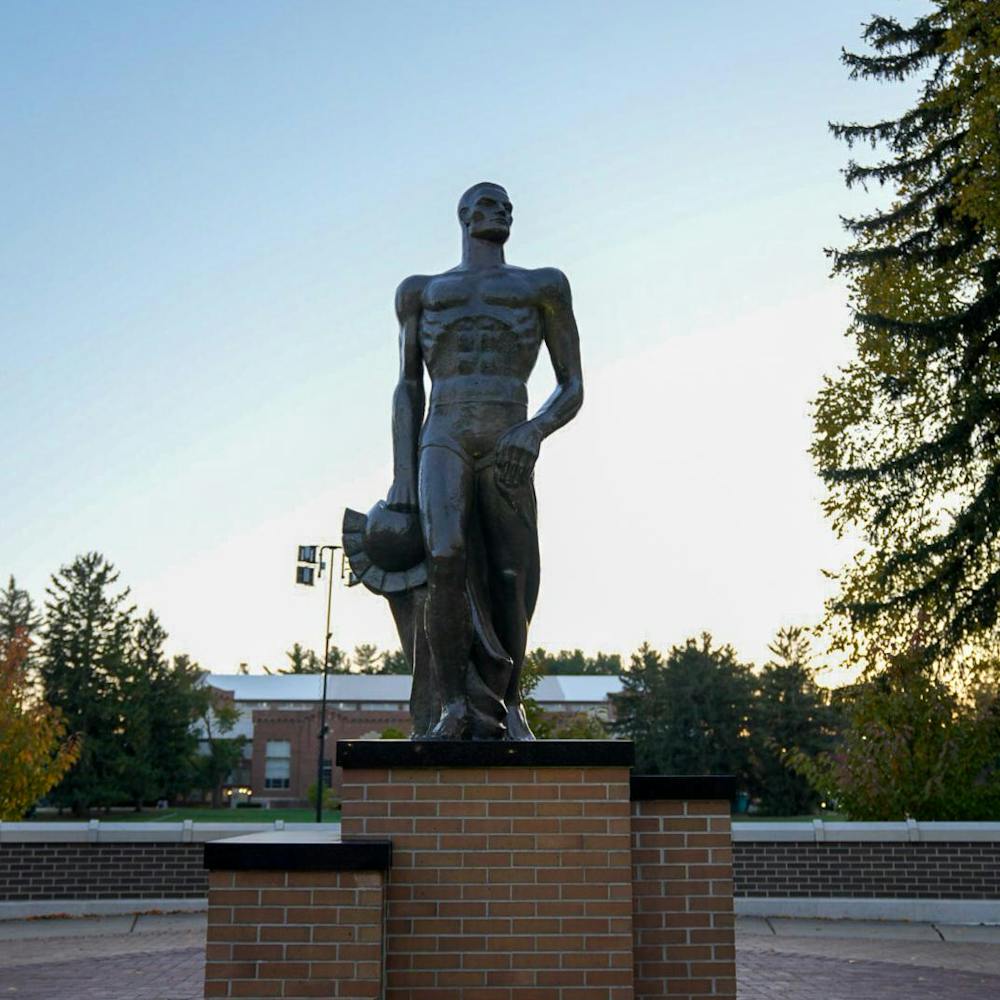Zimbabwean President Robert Mugabe is, in his own words, a “Hitler of the time.”
“This Hitler has only one objective: justice for his own people, sovereignty for his people, recognition of the independence of his people and their right to their resources,” Mugabe said in a 2003 speech at the state funeral of one of his cabinet ministers.
“If that is Hitler, then let me be a Hitler tenfold.”
This same man received an honorary degree from MSU in 1990.
Mugabe, 84, has been head of the government of Zimbabwe since 1980. He first attained power in the 1960s as a leader of the Zimbabwe African National Union.
While he’s never been accused of the genocide that defined Hitler’s reign, under Mugabe’s leadership Zimbabwe began a campaign in 2005 to demolish urban homes, leaving 700,000 homeless. Mugabe said the campaign was targeting homes where illegal activity was present, but 2.4 million citizens have been negatively affected, according to a 2005 U.N. report.
These policy decisions, as well as others, resulted in the United States banning Mugabe from visiting the country that same year.
However, when Mugabe received the honorary degree from MSU 18 years ago, he was highly regarded as an international figure and educator, said Ian Gray, MSU’s vice president for research and graduate studies and chairman of MSU’s honorary degree committee.
“At the time the award was given to (Mugabe), he was doing really well,” Gray said. “As a university, how do you deal with a situation like that, which turned out so badly?”
About a year ago, students asked administrators to strip Mugabe of his degree.
Officials at ASMSU, MSU’s undergraduate student government, voted in March 2007 to demand that the administration revoke Mugabe’s honorary doctorate.
“There might have been positive things about (Mugabe) before, but there’s no debate now — he’s a monster,” said Michael Leahy, ASMSU’s Student Assembly chairperson, who introduced the bill.
Almost a year after the bill passed through the student government, no formal action has been taken by the administration.
“We haven’t discussed it at any great length,” Gray said.
About six to eight honorary degrees are given out by the university annually, Gray said, although the number can be as low as one per semester for commencement speakers.
A committee of 12 faculty members meets twice a year to discuss nominations coming from students, other faculty members and community members, he said.
“(An honorary degree) is one of these things that shows learning doesn’t cease when you leave a university,” Gray said.
The university lists criteria for an honorary degree nominee as a distinguished person in public life, business or academia, or a distinguished graduate of MSU.
MSU President Lou Anna K. Simon said the Honorary Degree Committee’s informal recommendation was for Mugabe to keep his degree.
“They believe what he was given should stand because of what he had done in the education system at that time,” Simon said. “It was in the context of being a speaker and it was given before the controversy arose.”
Support student media!
Please consider donating to The State News and help fund the future of journalism.
David Wiley, director of MSU’s African Studies Center, was part of the nomination process for Mugabe in 1990.
Mugabe’s degree was given because of MSU’s relationship with the University of Zimbabwe, Wiley said, which is the largest connection with an African university in the United States.
“It was not given for his personal qualities. It was given because of the depth of linkage,” he said.
Despite the decision by the University of Edinburgh in the U.K. to revoke an honorary degree in 2007 given to Mugabe in 1984, Wiley said there’s no precedent for revoking an honorary degree at MSU.
“If (MSU) is going to start the process of taking back honorary degrees ? we need to look at all honorary degree recipients MSU has awarded,” he said. “Are we equal-opportunity in considering whose degrees should be rescinded?”
Wiley said other controversial recipients of honorary degrees — such as Vice President Dick Cheney in the spring of 2002 — could come under fire if MSU were to revoke Mugabe’s degree.
“I think what Mugabe has done is terrible, I don’t like it, but we don’t have a basis,” he said.
Leahy said there is a difference between Democrats at MSU not appreciating Cheney as a speaker versus a corrupt foreign power.
“We need to be mature enough to make a distinction between foreign powers and domestic leaders,” he said.
If Mugabe had earned his degree as a student, Leahy said, ASMSU wouldn’t ask the administration to revoke it. But in Mugabe’s case, he said, the degree was given.
“And it was given under false pretenses,” he said. “We’re hiding behind a precedent.”
Discussion
Share and discuss “Mugabe degree debate ” on social media.






